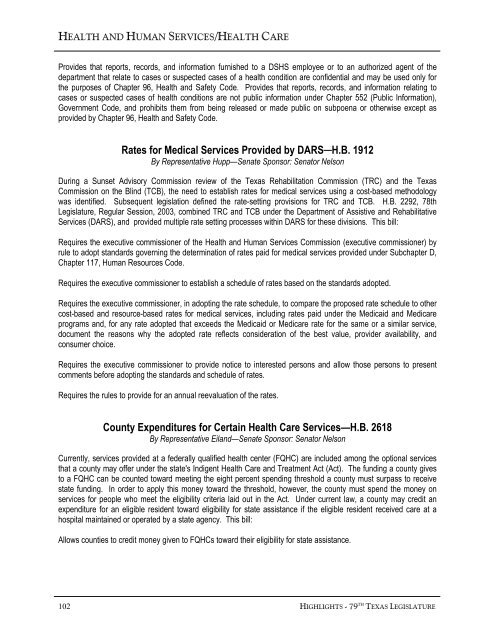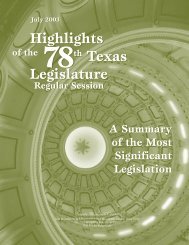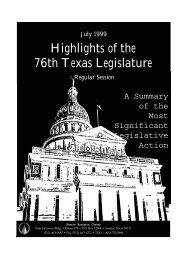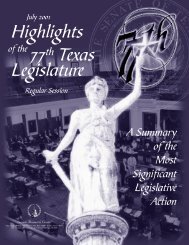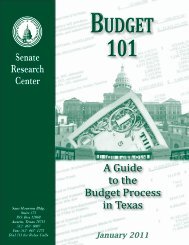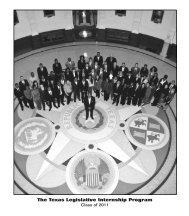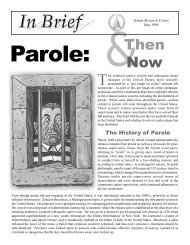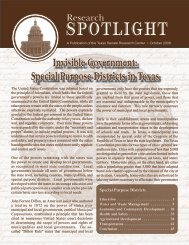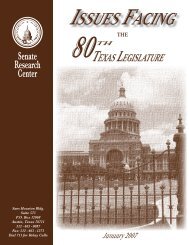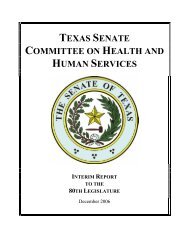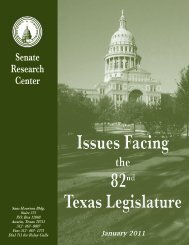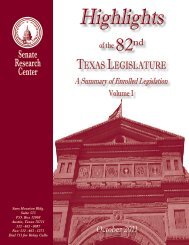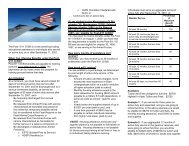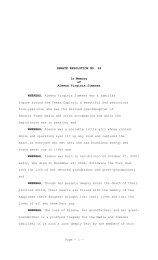Highlights of the 79th Texas Legislature - Senate
Highlights of the 79th Texas Legislature - Senate
Highlights of the 79th Texas Legislature - Senate
Create successful ePaper yourself
Turn your PDF publications into a flip-book with our unique Google optimized e-Paper software.
HEALTH AND HUMAN SERVICES/HEALTH CARE<br />
Provides that reports, records, and information furnished to a DSHS employee or to an authorized agent <strong>of</strong> <strong>the</strong><br />
department that relate to cases or suspected cases <strong>of</strong> a health condition are confidential and may be used only for<br />
<strong>the</strong> purposes <strong>of</strong> Chapter 96, Health and Safety Code. Provides that reports, records, and information relating to<br />
cases or suspected cases <strong>of</strong> health conditions are not public information under Chapter 552 (Public Information),<br />
Government Code, and prohibits <strong>the</strong>m from being released or made public on subpoena or o<strong>the</strong>rwise except as<br />
provided by Chapter 96, Health and Safety Code.<br />
Rates for Medical Services Provided by DARS─H.B. 1912<br />
By Representative Hupp—<strong>Senate</strong> Sponsor: Senator Nelson<br />
During a Sunset Advisory Commission review <strong>of</strong> <strong>the</strong> <strong>Texas</strong> Rehabilitation Commission (TRC) and <strong>the</strong> <strong>Texas</strong><br />
Commission on <strong>the</strong> Blind (TCB), <strong>the</strong> need to establish rates for medical services using a cost-based methodology<br />
was identified. Subsequent legislation defined <strong>the</strong> rate-setting provisions for TRC and TCB. H.B. 2292, 78th<br />
<strong>Legislature</strong>, Regular Session, 2003, combined TRC and TCB under <strong>the</strong> Department <strong>of</strong> Assistive and Rehabilitative<br />
Services (DARS), and provided multiple rate setting processes within DARS for <strong>the</strong>se divisions. This bill:<br />
Requires <strong>the</strong> executive commissioner <strong>of</strong> <strong>the</strong> Health and Human Services Commission (executive commissioner) by<br />
rule to adopt standards governing <strong>the</strong> determination <strong>of</strong> rates paid for medical services provided under Subchapter D,<br />
Chapter 117, Human Resources Code.<br />
Requires <strong>the</strong> executive commissioner to establish a schedule <strong>of</strong> rates based on <strong>the</strong> standards adopted.<br />
Requires <strong>the</strong> executive commissioner, in adopting <strong>the</strong> rate schedule, to compare <strong>the</strong> proposed rate schedule to o<strong>the</strong>r<br />
cost-based and resource-based rates for medical services, including rates paid under <strong>the</strong> Medicaid and Medicare<br />
programs and, for any rate adopted that exceeds <strong>the</strong> Medicaid or Medicare rate for <strong>the</strong> same or a similar service,<br />
document <strong>the</strong> reasons why <strong>the</strong> adopted rate reflects consideration <strong>of</strong> <strong>the</strong> best value, provider availability, and<br />
consumer choice.<br />
Requires <strong>the</strong> executive commissioner to provide notice to interested persons and allow those persons to present<br />
comments before adopting <strong>the</strong> standards and schedule <strong>of</strong> rates.<br />
Requires <strong>the</strong> rules to provide for an annual reevaluation <strong>of</strong> <strong>the</strong> rates.<br />
County Expenditures for Certain Health Care Services—H.B. 2618<br />
By Representative Eiland—<strong>Senate</strong> Sponsor: Senator Nelson<br />
Currently, services provided at a federally qualified health center (FQHC) are included among <strong>the</strong> optional services<br />
that a county may <strong>of</strong>fer under <strong>the</strong> state's Indigent Health Care and Treatment Act (Act). The funding a county gives<br />
to a FQHC can be counted toward meeting <strong>the</strong> eight percent spending threshold a county must surpass to receive<br />
state funding. In order to apply this money toward <strong>the</strong> threshold, however, <strong>the</strong> county must spend <strong>the</strong> money on<br />
services for people who meet <strong>the</strong> eligibility criteria laid out in <strong>the</strong> Act. Under current law, a county may credit an<br />
expenditure for an eligible resident toward eligibility for state assistance if <strong>the</strong> eligible resident received care at a<br />
hospital maintained or operated by a state agency. This bill:<br />
Allows counties to credit money given to FQHCs toward <strong>the</strong>ir eligibility for state assistance.<br />
102 HIGHLIGHTS - 79 TH TEXAS LEGISLATURE


